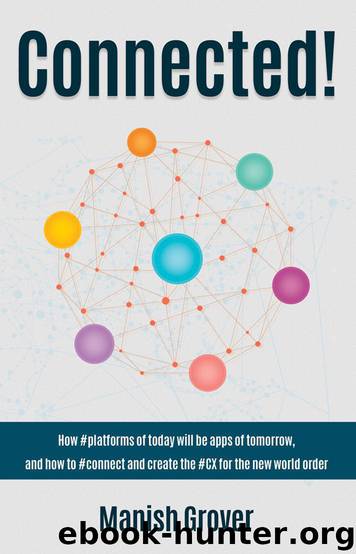Connected!: How #platforms of today will become apps of tomorrow by Grover Manish

Author:Grover, Manish [Grover, Manish]
Language: eng
Format: epub
Publisher: CD Press
Published: 2017-04-05T16:00:00+00:00
Tier 2: Ecosystems and Linking All propositions
In this tier, we will examine how the loyalty model can be linked strategically to the core differentiation that is developed through cross-industry partnerships, and by focusing on the customer.
Competition in a connected world comes from unexpected sources.
MasterCard and Visa are threatened today by mobile P2P payments that tend to use banking direct debit models instead of relying on the credit card networks alone (see ref 21). A few years ago anyone trying to build such a direct debit payment model would face an uphill battle. In fact, the market need for seamless payments and application of credit is precisely how the credit card networks rose to prominence. Over time they did well to create partnerships and loyalty models to innovate and provide additional customer value. It can be argued that the convenience in payments also came at a social cost of a credit burdened society. But these network models were also instrumental in developing benchmarks of financial credit worthiness which serve us well even today. Now, with the emergence of smartphones and digital technology, new and innovative competing payments models are coming faster to market. They are also able to quickly attain critical mass by piggybacking on the very model they intend to disrupt. The business agreements that Visa and MasterCard entered into with PayPal are an illustration of how the new payment models can quickly disrupt this widely accepted ecosystem of credit cards networks.
In addition, the recent two hour shipping and delivery phenomenon is affecting major players like FedEx and UPS, who also have to reckon with innovative delivery methods such as use of drones, and shipping via peer-to-peer networks in a shared economy model (see ref 32). The popularity of services such as Uber and Lyft is opening up yet another model for delivery that completely bypasses traditional shipping providers.
In the financial world, Bitcoin is poised to transform the very definition of currency, and makes government regulation difficult by opening up a completely unregulated model of value transfer. Governments and banks can regulate money, but how would they regulate flow of value (see ref 33)?
Download
This site does not store any files on its server. We only index and link to content provided by other sites. Please contact the content providers to delete copyright contents if any and email us, we'll remove relevant links or contents immediately.
Bad Blood by John Carreyrou(6611)
Rich Dad Poor Dad by Robert T. Kiyosaki(6607)
Principles: Life and Work by Ray Dalio(6421)
Playing to Win_ How Strategy Really Works by A.G. Lafley & Roger L. Martin(6235)
Management Strategies for the Cloud Revolution: How Cloud Computing Is Transforming Business and Why You Can't Afford to Be Left Behind by Charles Babcock(4563)
The Confidence Code by Katty Kay(4251)
Thinking in Bets by Annie Duke(4218)
American Kingpin by Nick Bilton(3875)
Delivering Happiness by Tony Hsieh(3418)
Project Animal Farm: An Accidental Journey into the Secret World of Farming and the Truth About Our Food by Sonia Faruqi(3212)
The Power of Habit by Charles Duhigg(3128)
The Tyranny of Metrics by Jerry Z. Muller(3065)
Brotopia by Emily Chang(3048)
The Marketing Plan Handbook: Develop Big-Picture Marketing Plans for Pennies on the Dollar by Robert W. Bly(3046)
Mastering Bitcoin: Programming the Open Blockchain by Andreas M. Antonopoulos(3035)
I Live in the Future & Here's How It Works by Nick Bilton(2993)
The Content Trap by Bharat Anand(2917)
Building a StoryBrand by Donald Miller(2896)
Applied Empathy by Michael Ventura(2890)
